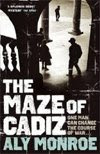When
in the process of writing a book , like a lot of other authors, I don’t
normally read very much. But when I’ve sent one off to my agent, as I have just
done, I do read. I have a pile of books I’m looking forward to over the
Christmas holidays.
 The
book I’ve read so far is an extraordinarily long-delayed catch up. The book
itself dates back to 1928. It’s Ashenden by
W Somerset Maugham, sometimes considered as the first modern spy story by,
amongst others, Eric Ambler.
The
book I’ve read so far is an extraordinarily long-delayed catch up. The book
itself dates back to 1928. It’s Ashenden by
W Somerset Maugham, sometimes considered as the first modern spy story by,
amongst others, Eric Ambler.
It
isn’t a novel, more a series of vignettes and character studies of what I tend
to think of as the cigar and brandy school, I suppose. Ashenden himself is not
a spy but a writer pressed into service during WW1, much as Maugham himself
was, an agent, report writer and opinion giver, who deals with spies. The
characters are people Ashenden meets, deals with, bears with, entertains – and
sometimes betrays.
Last
Christmas I read Chasing Lost Time,
Jean Findlay’s revealing biography of her great-great-Uncle C K Scott
Moncrieff. As well as serving gallantly as a soldier in WW1, he went on to
translate Proust (and Pirandello) while also acting as a spy in Italy.
In
the fiction there is something of the same – hotel life, large sums of money
for bribes, and a curious mix of tedium and pervasive threat.
Maugham
had been a spy in WW1 – he used some of the experience in Ashenden, though, as he is careful to point out, there
is a considerable difference between the reality of intelligence– often boring and always
incomplete – and fiction.
By
today’s standards, Maugham’s Ashenden would be regarded as judgemental and snobbish.
There are women called ‘coarse and vulgar’. There are elements of Joseph
Conrad’s narrator Marlow and of Guy de Maupassant stories, a possibly cynical,
sometimes ridiculous, account of people’s motives: a woman wants to recover an
expensive (for her) watch she gave to her dead lover; an American makes a
principle out of his laundry and ends up dead in the Bolshevik revolution in
Petrograd; Ashenden himself, in rather Byronic mode, finds the love of his
life’s insistence on scrambled eggs in the morning too much to bear; a
womaniser called the Hairless Mexican kills the wrong Greek; and Ashenden
himself delivers a British man to a firing squad and watches the German wife of
the executed man flounder in not knowing what has happened.
My
impression? The difference between life and fiction is that in the latter the
Indian dies. In WW1, the Germans were
keen to encourage unrest in India (then a British dominion) so as to keep more
British troops there. Maugham himself was involved with tracking an Indian
nationalist collaborating with Berlin. In real life he survived. His fictional
counterpart is, for love, enticed across the boarder.
Fiction
is love? I don’t know.
But
Happy Christmas and Happy Reading, everybody!
















